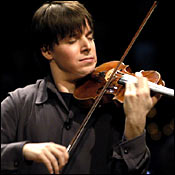
Keeping a traditional career afloat in today’s ever-narrowing world of classical music is no easy thing, but violinist Joshua Bell seems to be making it work for him. He is busy on the recital circuit, appears with all the big orchestras, enjoys playing chamber music and an occasional contemporary piece, and even makes recordings, most recently a basket of sweets for Sony Classical titled Romance of the Violin. Many of the items on that disc, popular with generations of violinists, turned up not long ago in Bell’s soirée at the Kaplan Penthouse in the Rose Building, a concert with the Orpheus Chamber Orchestra and pianist Simon Mulligan that was televised live from Lincoln Center.
It was a pleasantly relaxed occasion, thanks in part to Bell’s easygoing informality and towheaded charm, still disarming at age 36. In fact, Bell could very easily have sold himself as a crossover heartthrob right from the beginning, only to burn out and vanish much like the talented but unfortunate Eugene Fodor did back in the seventies. Instead, Bell has sensibly treated his boyish appeal as a useful ornament rather than the main draw, which has always been his superior technical abilities and attractive musical manner. I can’t say that Bell projects an aura that immediately sets him apart as an especially distinctive or unique personality, but his rock-steady bow arm, perfectly centered intonation, infallible fingers, lyrical spirit, and natural musical instincts are qualities that are hard to resist.
All these good things were on display at the Penthouse in bonbons by Kreisler, Bach, Dvorák, Ravel, Gershwin, Massenet, Debussy, Chopin, and others. It seems pointless to berate the violinist and Lincoln Center for promoting such a soft-core classical event, since Bell has more than proved himself in sterner stuff. Beyond that, the violinists he holds up as his idols and whose photos he had brought along with him—Kreisler, Heifetz, Milstein, and his teacher, the great Josef Gingold—also thrived on this material when they were not addressing heavier thinkers. Maybe now that Bell has indulged himself, he might consider trading the cozy surroundings of the Penthouse for the depths of Carnegie’s new Zankel Hall and surprise us with something a bit more down and dirty.
Young violinists are still embarking on careers with high hopes. Frank Huang, 25 and hailing from Houston, recently took an important step forward: a recital in Alice Tully Hall, with Dina Vainshtein at the piano, as the 2003 winner of the Walter W. Naumburg International Violin Award. His program was nothing if not challenging: the world premiere of Donald Martino’s Sonata for Solo Violin, a half-hour score that shows this important composer at his most expressive and richly inventive; one of Schubert’s most inspired late works of “heavenly length,” the C Major Fantasy; Ravel’s bluesy Sonata in G; Tartini’s Baroque dazzler, the “Devil’s Trill” Sonata; and Paganini’s “La Campanella” Caprice, with its awesome showers of left-hand pizzicatos and rapid passagework.
Huang made everything he played seem easy without leaving a note to chance. Evidence of his technical skill came at every turn: the breathtaking blend of trills and inner voices in the Tartini, the magisterial command of the Martino sonata’s multilayered drama and wide emotional range, the soaring spiritual beauty in Schubert’s exquisite variations on his own song, “Sei Mir Gegrüsst.” In the end, what impressed most was Huang’s total grasp of each musical idiom he addressed and his ability to communicate such a variety of styles with force and immediacy. A debut recital of this quality used to be an automatic passport to a major career. I wonder if it still works that way.
Among the last of the many small opera troupes that once proliferated in New York City a generation ago, the Bronx Opera is a hardy survivor that has staged many welcome rarities during its 36 years, most recently Rossini’s L’Equivico Stravagante (The Bizarre Deception), which the company brought to the Kaye Playhouse. Only 19 when he wrote the piece, his first full-length comedy, in 1811, Rossini was already fully in charge of the stage, even if he hadn’t yet found the special lilt and fizz that would soon make his music the rage of Europe. In fact, this farce survived only three nights before the Bologna police stepped in and banned further performances—the plot hinges on an attempt to pass off the heroine as a male castrato, while one audacious trio, involving a character who shows an unhealthy interest in a lady’s foot, had to be excised before the premiere.
After that bad start, L’Equivico Stravagante vanished from sight until the 1960s, waiting until 2002 before an authentic critical edition could be prepared and performed at the Rossini Festival in Pesaro. The libretto, by one Gaetano Gasbarri, would hardly raise eyebrows today, but the text is still a problem, densely larded with weird linguistic exaggerations and florid metaphors, while the dramatic action itself is rather disorganized. These drawbacks never dampened the spirit of the Bronx Opera performance, conducted by the company’s artistic director, Michael Spierman, and staged by his son, Benjamin. In some ways this respectful traditional approach was preferable to the production I saw in Pesaro, which fashionably presented Gamberotto as a modern-day industrialist rather than as an upwardly mobile farmer, while his daughter Ernestina was portrayed as a power-hungry career woman à la Joan Crawford. I’m surprised the update didn’t drop the castrato angle and turn her into a transsexual.
No, the opera works better when presented gimmick-free, with singers who can handle the florid vocal lines and enjoy the often lunatic plot turns. Anna Tonna effectively stole the show as Ernestina, offering a prototype of the classic quick-witted Rossini heroine with a heart of gold as well as showing off her warm, secure mezzo-soprano to maximum advantage. The rest of the cast was variable perhaps, but everyone onstage, and the audience as well, was clearly having a grand time.